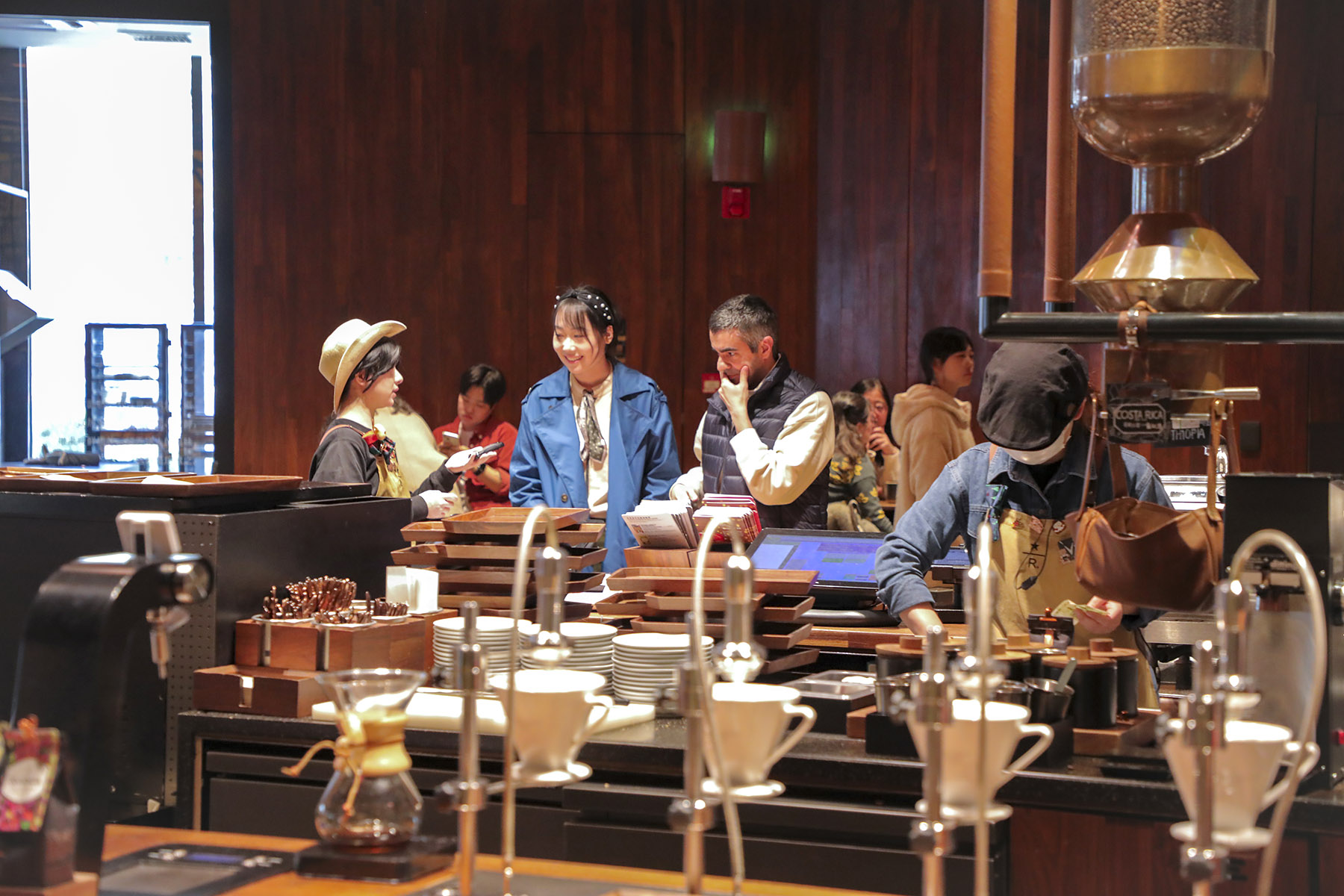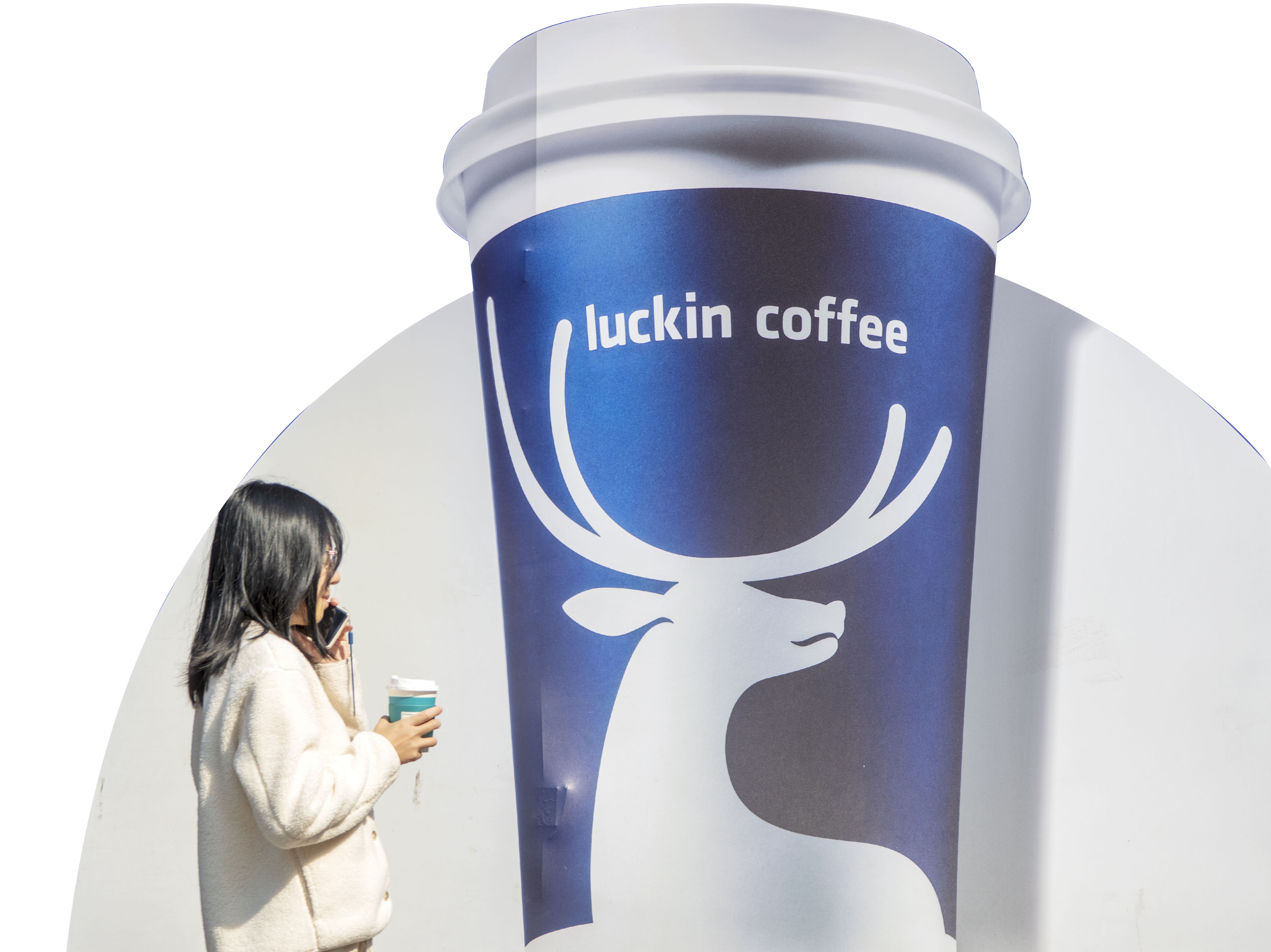Leading brands grapple with need to make products affordable for consumers while maintaining their own financial viability

Luckin Coffee, China's largest coffee chain that became highly popular after it priced a cup at just 9.9 yuan ($1.36), has announced rate hikes across its product lineup, leaving many office workers feeling the pinch.
In the wake of Luckin's price increase, Starbucks is considering selling a stake in its Chinese operations, while Beijing-headquartered Cotti Coffee has suspended its shop-in-shop franchise model.
Industry analysts said these developments indicate that the prolonged "coffee price war" in the Chinese market over the past two years is now gradually coming to an end.
READ MORE: Competition in coffee chain market intensifies
Luckin has raised the prices of many of its offerings by around 3 yuan, with the Americano, previously priced at 23 yuan, now costing 26 yuan. Similarly, the price of a latte has gone up from 26 yuan to 29 yuan, while the popular coconut latte has seen its price climb from 29 yuan to 32 yuan. Even after discounts, these drinks are now priced at about 15 yuan.
Luckin used to offer a majority of its beverages at a discounted price of 9.9 yuan after using a widely available coupon. However, customers will now be able to claim only one coupon per week.
Moreover, the 9.9 yuan discounts are now limited to just a few select items, such as the Americano, latte and oat milk latte, and the range of eligible stores has been dramatically reduced as well.
According to Beijing-based food and beverage data platform Canyan Data, Luckin Coffee now operates over 21,900 outlets across China.
"First, the coupons were there every day, then once a week, and now they're almost impossible to find. It's as if Luckin is gradually pushing us to accept higher prices, step by step," said Zhao Mengxiao, a 28-year-old office worker in Beijing.
"Losing Luckin's cheap coffee was a real blow, but Cotti's unlimited offer at 9.9 yuan has been a relief," Zhao said. "At least for now, I can still get my coffee at a price that doesn't break the bank."
Cotti's 9.9 yuan offering may only be a temporary reprieve before it too is forced to reevaluate its pricing strategy, Zhao added.
Luckin's retreat from the sub-10 yuan coffee arena is widely seen as a harbinger of broader industry trends, as brands try to balance affordability for consumers with maintaining financial viability for themselves, especially in the face of rising input costs that are squeezing profit margins across the industry.
The global coffee market has been roiled by significant supply chain volatility recently, with a confluence of factors, including the effects of climate change and rising international logistics costs, pushing Arabica coffee futures prices to levels not seen in nearly half a century.
Coffee futures rose to a fresh all-time high above $4.38 per pound in the Intercontinental Exchange in New York on Feb 13, an increase of over 119 percent over the past year.
Countries like Brazil and Vietnam, which are crucial sources of the world's coffee supply, have grappled with a combination of droughts and pest infestations, leading to significant declines in production volumes, said Zhu Danpeng, an independent food and beverage analyst.
That said, coffee chains like Luckin usually have long-term supply agreements with producers to help stabilize their procurement costs and insulate themselves from the impact of market volatility, Zhu added.
Luckin Coffee signed a 10-billion-yuan coffee bean purchase memorandum with the Brazilian Trade and Investment Promotion Agency in November. The deal will secure the delivery of 240,000 metric tons of coffee beans to Luckin over the next five years, ensuring stable supply of the critical raw material for the rapidly expanding coffee chain, according to the company.

Meanwhile, Luckin announced in December a reduction in the prices of its raw material supplies for franchisees, effective Jan 1,2025. The price adjustments covered more than 80 different products, with the cost of coffee beans alone set to decline by an average of 16.8 percent.
The dramatic increase in the cost of coffee beans might be a key factor driving price adjustments across the industry. However, in the case of Luckin, it appears that the company is looking to gradually move away from the intense price competition that has characterized the market in recent years, analysts said.
Luckin Coffee's CFO An Jing said during an earnings call last year that the company's profitability had declined as a result of its continued focus on 9.9 yuan coffee promotions, which had driven down the average prices of its products.
A fierce price competition has been raging in China's coffee market for the past two years, with the entry of Cotti Coffee serving as a key catalyst for the battle.
Cotti launched its first store in October 2022, leveraging on an aggressive low-price strategy to attract customers and drive foot traffic — a move designed to lure potential franchisees to join the Cotti network.
In February 2023, Cotti took the price war to the next level, introducing a nationwide all-products price of 9.9 yuan, which it vowed to maintain for the next three years.
Facing this relentless onslaught from Cotti, Luckin responded in kind. In April 2023, Luckin launched a 9.9 yuan per cup promotion at locations near Cotti's stores. By June, Luckin had expanded this discounted offering to all of its locations across China.
Luckin, which operates a predominantly company-owned store network, has been bearing the brunt of the pressure from its aggressive discounting strategies, as each low-priced cup of coffee sold directly eats into the company's profit margins, said Zhu Keli, founding director of the China Institute of New Economy.
The price war, which escalated a year ago, has taken a toll on Luckin's financial performance. The company reported a net loss of 82.3 million yuan in the first quarter of 2024 after a consecutive six-quarter streak of profits.
The company has now dialed back the intensity of its 9.9 yuan promotional campaigns, allowing it to return to profits in the second quarter, registering a net profit of 871 million yuan.
In the third quarter, Luckin reported a net profit of 1.3 billion yuan, with a net profit margin of 12.8 percent — a decline from the 13.7 percent recorded in the same period a year earlier.
ALSO READ: Coffee culture percolating in popularity in Chinese market
Luckin's decision to raise prices can be seen as a key move to regain control over its profitability, which had come under significant pressure due to the industry-wide price war, said Zhang Yuguang, chief analyst in the food and beverage sector at Kaiyuan Securities.
Several factors have contributed to this shift in Luckin's approach, Zhang said.
The company's extensive network of over 20,000 stores has left little room for massive expansion by its competitor Cotti, which currently operates only 8,723 stores, less than half of Luckin's footprint. Furthermore, Cotti has halted its shop-in-shop franchising model, indicating a slowdown in its pace of expansion, Zhang said.
According to reports by Bloomberg recently, Starbucks has been evaluating potential interest from investors in its Chinese operations, while similar strategies have been adopted by other global brands, including McDonald's Corp, Zhang said.
The potential for Starbucks to reconfigure its Chinese business could provide Luckin with an even more favorable market landscape, allowing the company to exercise greater pricing power, Zhang said. "Luckin's price hike is a clear signal that the company is shifting its focus from aggressive market share expansion to building a more sustainable business model," Zhang said. "This transition could pave the way for a more stable and profitable future for the company."


